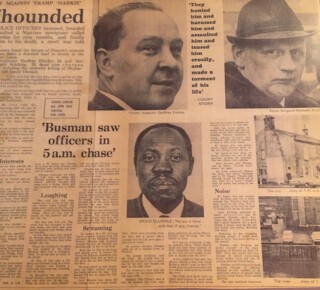Remember Oluwale
Tom Overton
David Oluwale arrived in Hull on 3September 1949, as a stowaway on the SS Temple Bar from Lagos, the city of his birth. He was probably 18 or 19. The British Nationality Act 1948 entitled him to settle as a citizen on production of a British Travel Certificate, though his method of arrival meant 28 days in prison under the Merchant Shipping Act. After serving his sentence, Oluwale made his way to Leeds. He knew people there, and was trained in tailoring. The work was irregular, and landlords were often racist. He moved around the area and got the nickname ‘Yankee’ among friends because of his love of dapper, American-style suits.
On 25 April 1953, Oluwale was involved in a fight with police and sustained a head injury. According to The Hounding of David Oluwale (2007) by Kester Aspden, ‘the consensus was that he was never the same after that night.’ A psychiatrist assessed him as ‘apprehensive, noisy and frightened without cause’. He was admitted to Menston Asylum – later High Royds Hospital – where he spent most of the next decade. The records of precisely what happened to him there were destroyed in a flood, but he was barely recognisable on his return to Leeds.
He began sleeping in doorways. Leeds City Police viewed him as a nuisance to be cleared from the centre of town. Inspector Geoffrey Ellerker and Sergeant Kenneth Kitching paid him special attention. They once drove him forty minutes away to the depths of Middleton Woods. Another time they deposited him outside a country pub at 4.45 a.m. and told him to ask for a cup of tea. An eyewitness described Oluwale being booted so hard between the legs he was lifted off the ground. In 1968, Ibrahim Swarray, who had arrived in Leeds from Sierra Leone in 1953, met Oluwale in a betting shop and invited him back to his house for a meal. When Swarray asked about the top lip that ‘seemed to turn up at the bottom’ – it’s visible in the last photograph of him – Oluwale replied: ‘Police beat me so.’
Oluwale drowned in the river Aire on 18 April 1969. His body was recovered near Knostrop Sewage works on 4 May, and buried in a paupers’ grave at Killingbeck cemetery with nine others. It was only the actions of a whistleblowing police cadet, Gary Galvin, that brought Ellerker and Kitching to trial in 1971. Both men admitted beating Oluwale, but claimed it had been justified by his conduct. They were, the defence said, the ‘night-soil men’ of society. It was never proved who had replaced ‘BRIT’ with ‘WOG’ on the nationality columns of Oluwale’s charge sheets, and it couldn’t be proved that Ellerker and Kitching were the two men whom a witness saw chasing someone down Call Lane to the river on 18 April. They were tried for manslaughter and found not guilty. Ellerker, who was involved in another misconduct case, got three years for assaults on Oluwale; Kitching, 27 months.
After the trial, fans in the Leeds United Kop sang songs about Oluwale at the police assembled in front of them. ‘REMEMBER OLUWALE’ was painted on a wall in the Chapeltown area of the city. In London, the artist Rasheed Araeen made his collage For Oluwale, which was shown at Swiss Cottage Library. It’s currently the centrepiece of an exhibition at the Tetley centre for contemporary art and education in Leeds.
Another room collates literary responses to Oluwale’s life: Jeremy Sandford’s Smiling David (1974); Oladipo Agboluaje’s stage adaptation of Aspden’s book, which premiered at Leeds Playhouse in 2009; Caryl Phillips’s loosely fictionalised Foreigners: Three English Lives (2007), which dwells on the idea of arrival and departure by water; poems by Jackie Kay, Zaffar Kunial and Ian Duhig, whose ‘Flooding Back’ alludes to the etymology of Oluwale’s name in Yoruba, ‘god comes home’:
But masked gods walk among us as a test
for hospitality’s a sacred duty
binding all who claim morality
Linton Kwesi Johnson, whose 1979 ‘Time Come’ arraigns Oluwale’s murderers (among others) on a loop playing in the gallery, is one of the speakers at a series of events in Leeds marking the 50th anniversary of Oluwale’s death.
